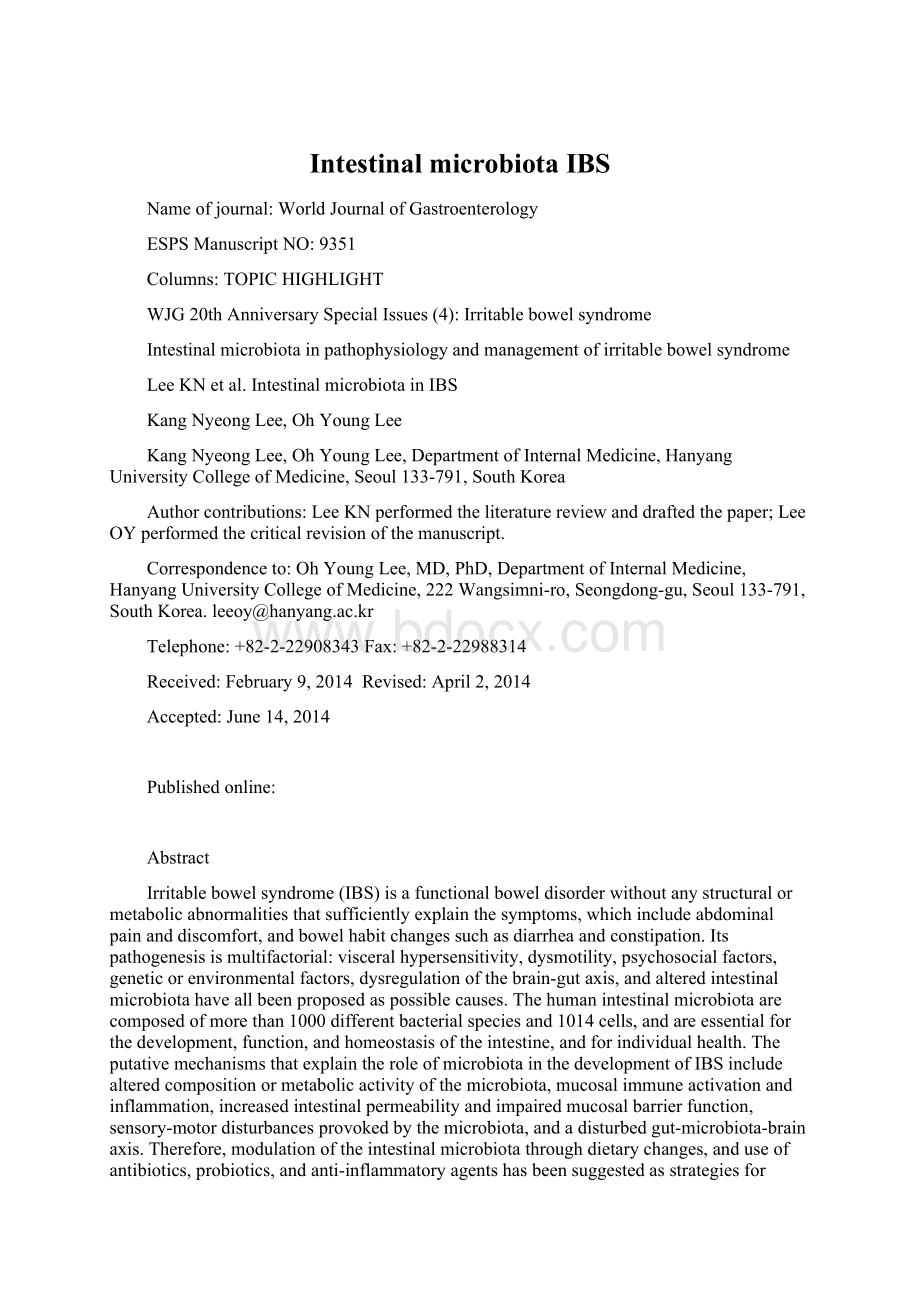Intestinal microbiotaIBS.docx
《Intestinal microbiotaIBS.docx》由会员分享,可在线阅读,更多相关《Intestinal microbiotaIBS.docx(23页珍藏版)》请在冰豆网上搜索。

IntestinalmicrobiotaIBS
Nameofjournal:
WorldJournalofGastroenterology
ESPSManuscriptNO:
9351
Columns:
TOPICHIGHLIGHT
WJG20thAnniversarySpecialIssues(4):
Irritablebowelsyndrome
Intestinalmicrobiotainpathophysiologyandmanagementofirritablebowelsyndrome
LeeKNetal.IntestinalmicrobiotainIBS
KangNyeongLee,OhYoungLee
KangNyeongLee,OhYoungLee,DepartmentofInternalMedicine,HanyangUniversityCollegeofMedicine,Seoul133-791,SouthKorea
Authorcontributions:
LeeKNperformedtheliteraturereviewanddraftedthepaper;LeeOYperformedthecriticalrevisionofthemanuscript.
Correspondenceto:
OhYoungLee,MD,PhD,DepartmentofInternalMedicine,HanyangUniversityCollegeofMedicine,222Wangsimni-ro,Seongdong-gu,Seoul133-791,SouthKorea.leeoy@hanyang.ac.kr
Telephone:
+82-2-22908343Fax:
+82-2-22988314
Received:
February9,2014Revised:
April2,2014
Accepted:
June14,2014
Publishedonline:
Abstract
Irritablebowelsyndrome(IBS)isafunctionalboweldisorderwithoutanystructuralormetabolicabnormalitiesthatsufficientlyexplainthesymptoms,whichincludeabdominalpainanddiscomfort,andbowelhabitchangessuchasdiarrheaandconstipation.Itspathogenesisismultifactorial:
visceralhypersensitivity,dysmotility,psychosocialfactors,geneticorenvironmentalfactors,dysregulationofthebrain-gutaxis,andalteredintestinalmicrobiotahaveallbeenproposedaspossiblecauses.Thehumanintestinalmicrobiotaarecomposedofmorethan1000differentbacterialspeciesand1014cells,andareessentialforthedevelopment,function,andhomeostasisoftheintestine,andforindividualhealth.TheputativemechanismsthatexplaintheroleofmicrobiotainthedevelopmentofIBSincludealteredcompositionormetabolicactivityofthemicrobiota,mucosalimmuneactivationandinflammation,increasedintestinalpermeabilityandimpairedmucosalbarrierfunction,sensory-motordisturbancesprovokedbythemicrobiota,andadisturbedgut-microbiota-brainaxis.Therefore,modulationoftheintestinalmicrobiotathroughdietarychanges,anduseofantibiotics,probiotics,andanti-inflammatoryagentshasbeensuggestedasstrategiesformanagingIBSsymptoms.ThisreviewsummarizesanddiscussestheaccumulatingevidencethatintestinalmicrobiotaplayaroleinthepathophysiologyandmanagementofIBS.
©2014BaishidengPublishingGroupInc.Allrightsreserved.
Keywords:
Immunity;Irritablebowelsyndrome;Microbiota;Permeability;Probiotics
Coretip:
Irritablebowelsyndrome(IBS)isafunctionalboweldisorderwithmultiplepathophysiology,whichisnotfullyunderstood.IntestinalmicrobiotahasrecentlybeenpostulatedtobeinvolvedinthepathophysiologyofIBS.ManystudiesofIBSfocusoninvestigatingtheefficacyofmodulatingthemicrobiotabyprobioticsandantibiotics.However,theroleoftheintestinalmicrobiotainthepathophysiologyandmanagementofIBSisnotclear.Thisreviewprovidestheaccumulatingevidenceonit.
LeeKN,LeeOY.Intestinalmicrobiotainpathophysiologyandmanagementofirritablebowelsyndrome.WorldJGastroenterol2014;Inpress
INTRODUCTION
Irritablebowelsyndrome(IBS)isafunctionalboweldisordercharacterizedbyabdominalpainordiscomfortrelievedbydefecation,andaccompaniedbychangesinbowelhabitssuchasdiarrheaorconstipation,whichcannotbeexplainedbystructural,biochemical,ormetabolicabnormalities[1].ThesymptomsofIBShavebeenaccountedforasresultingfromvisceralhypersensitivity,intestinaldysmotility,geneticorenvironmentalfactors,psychologicalfactors,oradysregulatedbrain-gutaxis[2].Inadditiontothesefactors,bacterialinfection,dysregulatedintestinalimmunefunction,andchroniclow-grademucosalinflammationhaveallbeensuggestedasputativepathogeneticmechanisms,inwhichtheintestinalmicrobiotamightplayanimportantrole,buttheirroleinIBScannotbefullyexplained(Figure1)[3,4].
Intestinalmicrobiotaisacollectivetermforacomplexecosystemofmicrobesinhabitingtheintestine[5].Inthehumanintestine,thisecosystemmayincludeanyoneofover1000microbialspecies,and1014cells(i.e.,about10timesmorethanthenumberofhumancellsinthebody[6]),containing150-foldmoregenesthanthehumangenome[7].Themicrobiotacanbedividedintomucosalandluminalsubtypes[8],anditwaspreviouslythoughttocomprisethreepredominantenterotypes:
Bacteroides,Prevotella,andRuminococcus[9],althoughsuchastrictcategorizationisnolongerwidelyaccepted[10].
Toevaluatethecompositionandmetabolicactivityoftheintestinalmicrobiota,culture-dependentand–independenttestshavebeendeveloped[11].Ithasbeenshownthatsizeanddiversityofthemicrobiotaincreasedistallyfromtheuppertothelowergastrointestinal(GI)tract[12]andaremodulatedbygastricacid,intestinalmotility,andthefunctionoftheileocecalvalve.TheirdistributionalsovariesaccordingtotheregionoftheGItractwithgram-positivefacultativeanaerobicbacteriaintheproximalsmallintestineandgram-negativeanaerobesinthedistalsmallintestine.Althoughthecompositionanddiversityofthemicrobiotaaregeneticallycontrolledfrombirthandbecomestableafterweaningandthroughoutlife,qualitativeandquantitativechangescanoccuroverthelongitudinalandcross-sectionalaxesoftheintestine:
changesinbacterialenzymesandmetabolicactivity,aswellasinmicrobialpopulations.Thecompositionandmetabolicactivityofthemicrobiotavarybetween,butalsowithin,individualsduetomanyfactorsincludingmodeofdeliveryatbirth,diet,sanitation,antibiotics,andageing[13].Atbirth,contaminationfromthevaginalcanalprovidestheintestinewiththematernalmicrobiome,whileduringadeliverybycesarean-section,thegutcomesintocontactwithcommensalsfromtheskinandthesurgicalenvironment[14].Thecompositionofthemicrobiotacanalsobealteredbythefeedingmethod:
bifidobacteriaincreaseinbreast-fedbabies(i.e.,babiesreceivingahigh-carbohydrateandhigh-fiberdiet),andBacteroidesspp.increaseinformula-fedbabies(babiesreceivingahigh-fatdiet)[15].Lastly,itcanvaryacrossgeographicalregions,e.g.,betweenruralAfricaandurbanEurope[16].
Theintestinalmicrobiotaisessentialformaintainingindividualhealth,includingnormalGIfunction.Inthiscontext,itsmainfunctionsaremetabolic,protective,andtrophic:
itcanhelptodigestandabsorbnutrients,andproducesavarietyofbeneficialcompoundssuchasshort-chainfattyacids(SCFA)[17],itcanactasabarrieragainstpathogensbyadheringtothemucosa,generatingimmuneresponses,andinteractingwithcomponentsoftheepitheliallayer,itcanalsoinfluencethedifferentiationandproliferationoftheintestinalepithelialcellsandthedevelopmentoftheentericimmunesystem.
Inparallelwiththebeneficialeffectsofmicrobialactivityonthegut,bacterialfermentationmaygiverisetolargeamountsofgasandthuscontributetothesymptomsofbloating,flatulence,andabdominaldistension,whicharecommonlyreportedbypatientswithIBS[18].AnassociationbetweenthemicrobiotaandIBShasbeensupportedbytheevidenceofmodulationofmucosalimmunity:
IBSsymptomswerefoundtobemorefrequentafteranepisodeofgastroenteritis,andsomeIBSsymptomswerefoundtoimproveafterantibiotictreatmenttargetingtheintestinalmicrobiota[19].Thisputativelinkwasalsodemonstratedinstudiesofprobiotics,whichmodulatedtheintestinalmicrobiotainIBSpatients.Finally,mucosalimmunity-gutmicrobiota-brainaxisisbeingsuggestedasapossiblepathwayforthedevelopmentofIBSduetoalteredintestinalmicrobiota.ThisreviewarticleexplorestheroleofthemicrobiotainthepathophysiologyandmanagementofIBS,andprovidesacomprehensivesummaryoftheevidencefortheconceptofIBSasamicrobiota-relateddisorder.
Despitethelargevolumeofstudiesoftheintestinalmicrobiota,ourunderstandingofitsroleinhealthanddiseaseisstillinitsinfancy.Instudyingthemicrobiota,culture-basedmethodsarebeingreplacedbyadvanced,culture-independent,moleculartechniques.However,thesetwoapproachesarecomplementary:
culturestudiesoffecalmatterorcolonicmucosaarevaluableforidentifyingfunctionalgroupsandforselectiveenumeration,whereasadvancedmolecularstudyareapowerfultoolformonitoringchangesinmicrobialcomposition.Themolecularmethodologyincludessequencingofthesmall-subunitribosomalRNAgenesthroughamplificationofnucleicacidsextractedfromfecalormucosalsamples,fingerprintingmethodssuchasdenaturinggradientgelelectrophoresis,targetedmethodssuchasfluorescenceinsituhybridizationandquantitativePCR,newhigh-throughputsequencing,and16SrRNA-basedmicroarraying[20]
PUTATIVEPATHOPHYSIOLOGICROLEOFINTESTINALMICROBIOTAINIBS
Alterationofthemicrobiota-gut-brainaxis
Themicrobiotainthegutcanbealteredbybrainfunction,andmicrobialalterationcan,inturn,influencebrainfunction.ItisevidencedbythefindingthatpatientswithIBSfrequentlyhaveaccompanyingpsychologicaldisorders,suchasanxietyordepression,andthosewithpsychologicalstressaremorelikelytodeveloppost-infectious(PI)-IBS.Thisconnectionbetweenthemicrobiota,thegut,andthebraininIBSpostulatestheexistenceofabidirectional,homeostaticnetwork,anditisanexcitingareaofongoingresearch.
Animalstudieshavedemonstratedtheinfluenceoftheintestinalmicrobiotaonbraindevelopment.BraindysfunctioninGerm-free(GF)micewasreported,includinganexaggeratedhypothalamic-pituitaryresponsetomildstress[21],moreexploratoryandrisk-takingbehavio